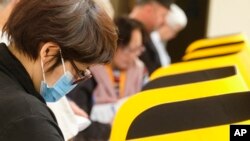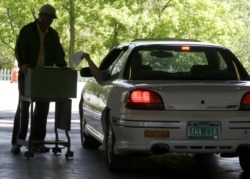Concerns are mounting that the coronavirus pandemic could disenfranchise large numbers of American voters in the U.S. presidential election.
"This is a moment we have never experienced before with regards to elections in modern times,” said David Daley, a senior fellow with the FairVote advocacy group.
Efforts to contain the spread of COVID-19 in the United States have prompted government-mandated quarantines, and widespread advisories against public gathering have resulted in school closures and cancellation of performances, conferences, and sporting events across the country.
Upcoming primaries
The U.S. state of Louisiana on Friday postponed its primary election contest to select the Democratic and Republican Party nominees to run in the November presidential election. Citing the public health threat posed by the coronavirus, Louisiana pushed back its primary from April 4 to June 20.
The next state primaries are scheduled to be held on Tuesday in Ohio, Florida, Illinois and Arizona, and officials say they are taking precautions to protect public health.
On Thursday, Governor J.B. Pritzker of Illinois encouraged local authorities to expand the hours for early voting prior to election day.
"Voting early usually means avoiding any crowds,” Pritzker said.
The U.S. Centers for Disease Control and Prevention recommends increasing drive-up voting, arriving at polling stations at nonpeak hours and maintaining social distancing space while waiting in line to minimize direct contact with people who may have been exposed to the virus.
Bipartisan threat
Concern about how fear of the coronavirus could depress voter turnout, especially among high-risk groups such as older Americans, has prompted calls for expanded mail-in voting so people can avoid large groups on Election Day.
In Congress, Sen. Ron Wyden, a Democrat from the state of Oregon, introduced a bill to expand early mail-in ballot options for voters in all 50 states. The bill also would provide $500 million to fund this effort.
"This a nonpartisan, commonsense solution to the very real threat looming this November,” Wyden said in a statement Tuesday.
The two major political parties have been at odds over past proposals to expand voting, with Republicans citing concerns over possible voter fraud, and Democrats criticizing opposition as a means to suppress the vote in Democratic-majority communities.
The coronavirus threat to Republican and Democratic voters alike, advocates say, could unite both sides to support needed election reform.
Colossal challenge
Thirty-four states and the District of Columbia now offer “no excuse” absentee voting by mail. Other states require voters to document their reasons for requesting an early ballot, such as conflicting travel or work schedules.
Gearing up a mail-in voting system in all 50 states in time for the presidential election in November would be a colossal challenge but surmountable, advocates say.
"We know how to do vote by mail and we know how to do it in a safe and secure way,” said Daley of FairVote, but it is essential that “everybody has equal access to voting by mail,” he added.
To handle an increased number of mail-in ballots, states would need to acquire more optical scanners and develop procedures to quickly verify and count the ballots.
Because mail-in ballots are time-consuming to count compared with voting machines that automatically tally results, mail-in ballots are often considered only in very close elections.






